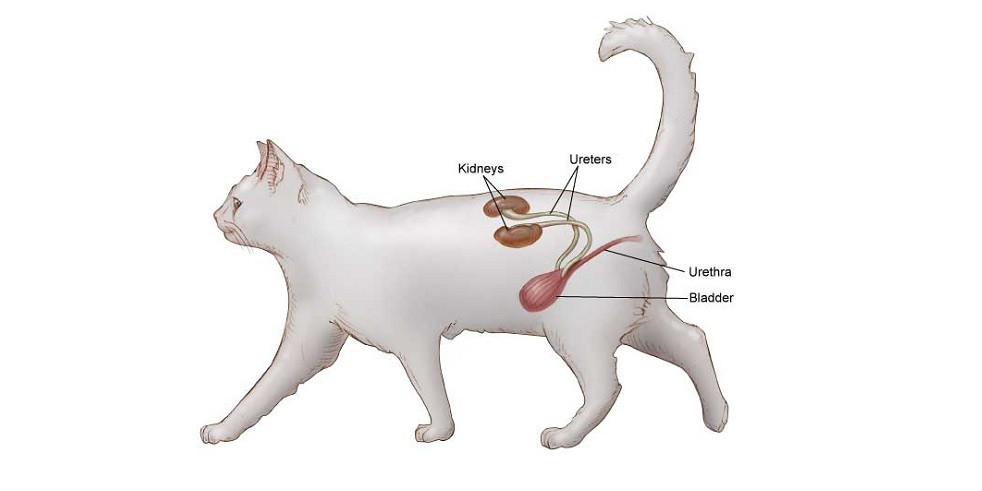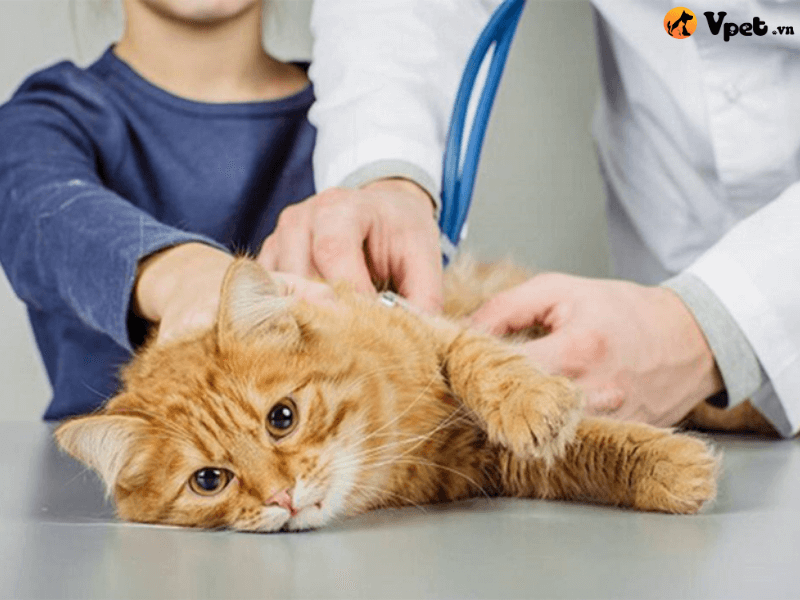Cat with Kidney Failure – Can it be diagnosed and treated at home?

In the past few days, you suddenly realized that your cat has a rather unusual expression than usual, making you very worried, so you took the cat to the doctor. And your cat has been diagnosed by a doctor as having kidney failure, making you feel extremely confused when you don't know how your cat with kidney failure needs to be treated? The article right below of the Tinhot.asia will help you better understand this issue.
What Is Kidney Failure In Cats?
A cat's kidneys do many important things. They help control blood pressure, make hormones, stimulate the bone marrow to make more red blood cells, and remove waste from the blood.
A cat's kidneys begin to decline with age. Left untreated, kidney disease can lead to a variety of health problems.
When chronic, there is no cure. But with early diagnosis and good care, you can help enhance both the quality and longevity of your cat's rabbit.
Older cats aren't the only ones at risk. Kittens that may be born may also already have kidney disease.
Why Cats Have Kidneys
Causes of kidney failure can include kidney disease, urinary tract obstruction, urinary tract or ureteral obstruction , certain prescriptions , lymphoma , diabetes , and genetic factors .
There are two main types of kidney failure in cats . Each type has different causes, treatments, and outlooks.
Cat with Acute Kidney Failure
Cats Acute kidney failure develops suddenly, over days or weeks. It occurs in cats of all ages, and causes of acute kidney failure in cats stem from:
Toxins are the most common cause of acute kidney failure. Antifreeze, toxic plants like lily, pesticides , cleaning fluids, and some human medications are highly toxic to a cat's kidneys.
Even a single tablet of ibuprofen can lead to kidney failure. Check around your home and garage for these substances and make sure your cat can't get into them.
Trauma, especially involving a broken pelvis or ruptured bladder
Shock from rapid blood loss or rapid dehydration, extreme heat, a dramatic increase in activity, vomiting and diarrhea can all cause a large drop in fluids.
-
Kidney infection
-
Blockages allow blood to enter the kidneys and out with urine
-
Heart failure with low blood pressure, which reduces blood flow to the kidneys
If diagnosed in time, it is easy to treat, on the contrary, when it has turned to chronic kidney disease, it is very difficult to treat.
Cats with chronic kidney failure
Cats with Chronic Renal Failure are common in cats 7 years of age and older.
Chronic kidney disease: While the exact causes of chronic kidney disease are not always clear, even to a veterinarian, some of the causes mentioned include:
-
Kidney infections and blockages, which may not cause acute kidney failure, but low kidney function for months or years
-
Other conditions, from dental disease and high blood pressure to thyroid problems and cancer
Kidney disease in cats
There are different types of kidney disease in cats including:

-
Kidney cancer – A relatively rare type of cancer. Kidney tumors can originate in the kidney (primary) or move from the kidney to another organ (secondary).
-
Most middle-aged cats often have kidney tumors. Renal lymphoma is a common cancer in cats that are positive for the feline leukemia virus. In general, there is no specific cause of kidney cancer.
-
Kidney Stones – The function of the urinary system is to remove waste from the body in the form of fluids. Some mineral wastes are sparingly soluble and may form crystals; If the transit time of these crystals through the urinary tract is prolonged, the crystals can join together to form stones in the kidney.
-
Different types of stones are often associated with different specific causes. That is the process of forming kidney stones – the medical term called Nephrolithiasis.
-
Pyelonephritis – Pyelonephritis is an inflammation, infection of the kidney caused by bacteria in the upper urinary tract or in other parts of the kidneys.
-
Polycystic kidney disease (PKD) – This disease is caused by abnormal cyst formation in kittens (which is largely inherited, with only a small percentage recessive). Cysts will grow in the kidney and sometimes the pancreas, liver and/or uterus, causing kidney failure.
-
Chronic Kidney Failure – Chronic kidney failure, abbreviated as CRF, is a common illness that cats experience. The waste products produced during the digestion of food are carried by the blood to the kidneys for filtration and excreted as urine.
-
When the kidneys fail, it cannot remove these waste products and toxins build up in the blood causing clinical signs of kidney disease.
-
All breeds of cats of all ages can develop chronic kidney failure. However, older cats are often at a higher risk of developing the disease.
-
Acute Renal Failure – Acute renal failure, abbreviated ARF is a sudden decline in kidney function that results in changes in the body's chemistry including changes in fluid and mineral balance.
-
The changes that arise from ARF affect almost every system of the body. Urinary tract obstruction and various toxins including anticoagulants are responsible for acute renal failure in cats.
-
Kidney parasites – These are worms that enter the urinary tract and cause disease. However, some cats with the disease show no clinical signs, especially with Capillaria cats. Cats can be debilitated if they have kidney failure or severe infections.
-
Renal amyloidosis – This is a disease that results from the abnormal deposition of amyloid proteins throughout the body.
-
Amyloid deposition is caused by the body's inability to break down certain proteins. This leads to the accumulation of amyloid outside the body cells that damage other normal cells.
-
Glomerulonephritis – This is a kidney disorder caused by inflammation of platelets (platelets are microscopic components of the kidneys used to filter blood).
-
The disease is caused by immune complexes (clusters of antibodies and antigens) deposited on the glomeruli causing them to malfunction. If left untreated, glomerulonephritis can lead to chronic kidney failure.
Chronic ureteral obstruction (hydronephrosis) – This is a disease caused by a blockage of the ureters (small tubular structures that allow urine to pass from the kidneys to the bladder)
Accurately diagnose cats with kidney failure?
If at home, the owners can only rely on observing the cat's unusual manifestations such as loss of appetite, vomiting, thirst, frequent urination and bleeding, fatigue, and possibly constipation. or diarrhea, seizures or coma... to diagnose a cat with kidney failure, when the cat is taken to a veterinary facility, the clinic will be diagnosed by the following methods:
-
A blood test and a urine test will be one of the things you need to do as soon as you take your cat to the vet.
-
The cat will be carried out X-ray and abdominal ultrasound to determine the exact extent of kidney failure, and also to rule out some other similar causes.
-
If necessary, doctors will recommend performing a biopsy of kidney tissue to get the most accurate results.
Regardless of the method used, the results will show the specific extent of the disease and based on that, you can make the right treatment for your cat with kidney failure .
Signs to identify cats with kidney failure
.jpg)
-
Urinate frequently. While you might think this is a sign that your cat's kidneys are working properly, it actually means that the cat can't hold water anymore. Urinating outside the litter box is another signal.
-
Drink a lot of water. This means your cat is trying to replace the fluid she lost through urination.
-
Bladder and kidney infections. They grow more easily in dilute urine due to kidney production.
-
Lose weight and reduce appetite.
-
Vomiting, diarrhea and bloody urine
-
Mouth sores, especially on the gums and tongue.
-
Bad breath with an ammonia-like odor.
-
A brown tongue.
-
Constipation.
-
Tired and lethargic.
How to treat cats with kidney failure?
For cats with kidney failure , before performing any treatment, you should take the time to discuss specifically with your veterinarian about the cat's condition in order to make the best choice. Because the treatment of kidney failure in cats requires a combination of medication and the right diet, it may even require surgery and intravenous fluids.
Regarding the diet, cats need to reduce the amount of phosphorus and protein in the daily diet to the lowest level. In addition, cats need to increase food with vitamin D, omega 3, fatty acids. This diet needs to be carefully managed and ensures that the cat can drink the necessary amount of clean water for the body in a day.
And to be good for the cat during the treatment of the cat with kidney failure , the cat needs to live in a quiet, clean and fresh environment. In addition, you should consult with veterinarians to choose the drug that best suits your cat's health status, location, and symptoms.
Cats with long-term kidney failure will often undergo fluid therapy to support dehydration.
Protein in the diet is sometimes limited, as it can complicate matters further.
Although there is no cure for chronic kidney failure, there are steps that can be taken to minimize symptoms and slow its progression.
For example, giving cats a special kidney diet , or a diet low in protein , phosphorus , calcium, and sodium , is often helpful.
These processed foods often have special levels of fatty acids, unsaturated and potassium fatty acids omega 6 and omega 3 is higher, both of which showed beneficial to the kidneys. The downside is that these foods have no flavor.
If your cat is resistant to the new diet, you can use small amounts of tuna juice, chicken stock, or other flavor enhancers as directed by your veterinarian.
Maintaining water supply is very important. You will need to make sure your cat always has an adequate amount of clean water to drink.
If your cat has been diagnosed with dehydration, supplements can be injected intravenously or under the skin.
Phosphorus binders and vitamin D supplements are commonly given to cats with chronic renal failure to improve calcium and phosphorus balance, and reduce some of the secondary effects of renal failure.
H-2 receptor blockers, or medications that treat stomach ulcers and secondary gastritis that develop, can help increase your cat's appetite.
Depending on the condition and symptoms, other medications that may be considered include:
-
Antihypertensive drugs to lower blood pressure
-
Enalapril to inhibit angiotensin, a natural blood pressure riser
-
Erythropoietin to stimulate red blood cell production, thereby increasing oxygen in tissues
Care and food selection for cats with kidney failure
When a cat has kidney failure, the cat's kidney tissue will be gradually weakened, necrotic, destroyed and permanently unable to function as it should. And kidney failure will appear when more than 70% of healthy kidney tissue has been gradually destroyed. So what food to choose for cats with kidney failure?

But when the cat has kidney failure, the cat in addition to using the drug also needs to change the daily diet and choose the right foods to help the cat improve the condition better.
According to the advice of veterinarians, the best way for cats with kidney failure is to reduce the amount of phosphorus and protein in the meals (especially protein in meat). You can choose ingredients that don't contain meat, but you still need to make sure there's enough nutritional value for your cat.
You should pay attention to reducing the amount of protein in meat and eggs, reducing the amount of phosphorus in fish and beans, and reducing sodium in cereals and seafood, because this will help protect the cat's kidney tissue in a healthier way. , prevent weakening. In addition, you should also pay attention to giving your cat the necessary amount of water in the body, to avoid letting the cat fall into a state of dehydration.
If you have time, you can cook a separate diet for your cat, when the cat eats, you can add more broth or add gravy but should not be too salty in the cat's food. If you don't have time, you can choose to buy ready-made cat foods for cats with kidney failure that are currently on the market.
Conclude
Currently, there is no specific treatment for cats with kidney failure for this disease, only treating the symptoms to reduce the severity of the disease and prevent it from getting worse. With the right treatment, your cat also needs time to stabilize its health.
Kidney disease in cats is one of the most common groups of diseases. As a precaution, you should feed your cat wet foods or drink more water. Adding water will help your cat's kidneys filter waste more effectively, but without putting pressure on the kidneys.
This article is not a substitute for professional veterinary care. When your pet shows symptoms of illness, it is best to contact the nearest veterinary station directly.
However, in some cases of force majeure, you cannot take your baby to the vet. Please read the article carefully to get useful information, to help you get the best preparation for your pet.
So the question of how cats with kidney failure need to be treated has found the answer. Hope your cat gets well soon!